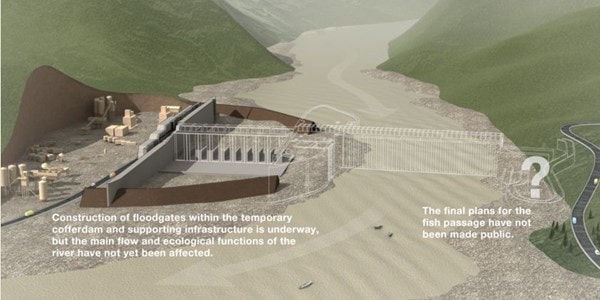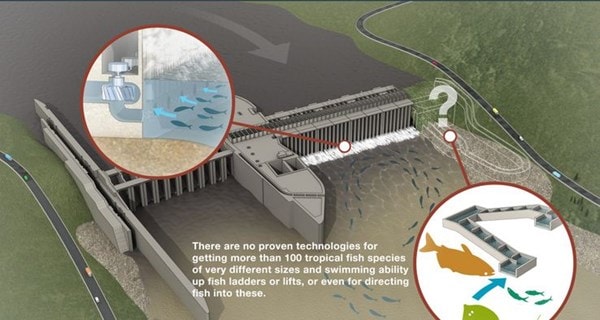The fate of the Mekong River hangs by a thread!
Time is running out to halt the construction of two hydroelectric dams in Laos and Cambodia. If built, they will cause irreversible damage to regional food security and seriously threaten the survival of rare dolphins living in the river.
 |
| Illustration of the Xayaburi dam model provided by WWF. |
The above content was emphasized by the World Wide Fund for Nature (WWF) in a press release issued from Bangkok, Thailand on June 19, 2014.
WWF said Laos announced its decision to continue construction of the Don Sahong dam in September 2013, bypassing the Mekong River Commission's consultation process. The much-criticized project will be one of the topics discussed at the Mekong River Commission's ministerial meeting from June 25-27. This is an intergovernmental organization, with the participation of delegates from the four lower Mekong countries: Vietnam, Laos, Cambodia, Thailand.
In January 2014, the Mekong River Commission Executive Board was unable to agree on whether to require the Don Sahong project to undergo regional review, so the matter was referred to the upcoming ministerial meeting.
“The impasse in resolving the Don Sahong dam issue shows the lack of cooperation in the region,” said Marc Goichot, Sustainable Hydropower expert at WWF-Greater Mekong.
“The Mekong is a shared river and the four countries must respect the agreements of the Commission when making decisions on dams that affect neighboring countries. Without effective cooperation in the region, food security will be threatened.”
The Don Sahong Dam would threaten the survival of the critically endangered Irrawaddy dolphins in the Mekong River and block the only dry-season fish migration route, increasing risks to the world’s largest inland fishery.
 |
| Illustration of the impacts of the Xayaburi dam construction provided by WWF |
To date, more than 150,000 people have signed a WWF petition calling for the project’s contractor, Mega First, to withdraw from the project. Construction is expected to begin in late 2014.
“The clock is ticking to stop the Don Sahong project. Laos should stop the project and wait until independent impact studies and consultations are completed,” said Chhith Sam Ath, Country Director of WWF-Cambodia.
If Don Sahong is still built, this will be the second dam on the mainstream of the lower Mekong River, after the Xayaburi dam that Laos started construction on despite disagreement from neighboring countries Cambodia and Vietnam.
Earlier this year, 40 NGOs issued a joint statement opposing the Xayaburi project and calling on Thailand to cancel the power purchase agreement related to the dam.
In assessing the Xayaburi dam plan, experts found serious data gaps and weaknesses in the migration pathways designed for fish and asserted that the dam would partially block the flow of sediment, undermining the river's ecosystem.
Laos has agreed to spend an additional $100 million to modify the dam's design to limit negative impacts on the river, but so far Laos has not come up with any solutions as promised in 2012.
“By deciding to build the dam, Laos hopes that its neighbors will believe that the risks of this project will naturally be resolved once construction begins. Therefore, the meeting in Bangkok will be an important moment to decide the fate of the Mekong River. It is not too late to suspend the Xayaburi project before it causes irreversible damage early next year,” Mr. Goichot said.
WWF calls on ministers from Mekong countries to postpone decisions on mainstream dams for 10 years to collect critical data and make decisions based on scientific evidence and in-depth analysis.
According to motthegioi.vn
